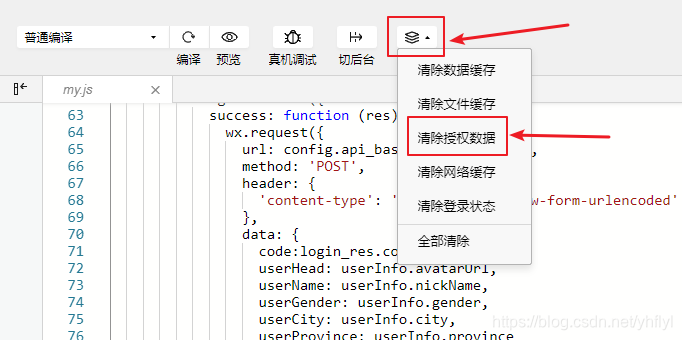小程式之登入授權(springboot做後端)
阿新 • • 發佈:2019-01-13
小程式登入流程:
https://developers.weixin.qq.com/miniprogram/dev/framework/open-ability/login.html
在onGetUserInfo中新增介面
onGetUserInfo(event) {
const userInfo = event.detail.userInfo
if (userInfo) {
wx.login({
success: function (login_res) {
wx.getUserInfo({
success: 需要注意因為傳送的是POST請求,所以需要將請求頭設定為 ‘content-type’ : ‘application/x-www-form-urlencoded’ 並將method設定為PSOT型別。
Springboot後臺資料處理
1、首先獲取的自己小程式的appid、secret,封裝為一個介面
public interface UserConstantInterface {
// 請求的網址
public static final String WX_LOGIN_URL = "https://api.weixin.qq.com/sns/jscode2session";
// 你的appid
public static final String WX_LOGIN_APPID = "xxxxxxxxxxxxxxxxxx";
// 你的密匙
public static final String WX_LOGIN_SECRET = "xxxxxxxxxxxxxxxxxxxxxxxxxxxxxxxx";
// 固定引數
public static final String WX_LOGIN_GRANT_TYPE = "authorization_code";
}
2、在pom中引入httpclient的包,分裝一個傳送get、post的請求類
<!-- httpclient -->
<dependency>
<groupId>org.apache.httpcomponents</groupId>
<artifactId>httpclient</artifactId>
<version>4.3.5</version>
</dependency>
傳送請求的工具類
import java.io.IOException;
import java.net.URI;
import java.util.ArrayList;
import java.util.List;
import java.util.Map;
import org.apache.http.NameValuePair;
import org.apache.http.client.entity.UrlEncodedFormEntity;
import org.apache.http.client.methods.CloseableHttpResponse;
import org.apache.http.client.methods.HttpGet;
import org.apache.http.client.methods.HttpPost;
import org.apache.http.client.utils.URIBuilder;
import org.apache.http.entity.ContentType;
import org.apache.http.entity.StringEntity;
import org.apache.http.impl.client.CloseableHttpClient;
import org.apache.http.impl.client.HttpClients;
import org.apache.http.message.BasicNameValuePair;
import org.apache.http.util.EntityUtils;
public class HttpClientUtil {
public static String doGet(String url, Map<String, String> param) {
// 建立Httpclient物件
CloseableHttpClient httpclient = HttpClients.createDefault();
String resultString = "";
CloseableHttpResponse response = null;
try {
// 建立uri
URIBuilder builder = new URIBuilder(url);
if (param != null) {
for (String key : param.keySet()) {
builder.addParameter(key, param.get(key));
}
}
URI uri = builder.build();
// 建立http GET請求
HttpGet httpGet = new HttpGet(uri);
// 執行請求
response = httpclient.execute(httpGet);
// 判斷返回狀態是否為200
if (response.getStatusLine().getStatusCode() == 200) {
resultString = EntityUtils.toString(response.getEntity(), "UTF-8");
}
} catch (Exception e) {
e.printStackTrace();
} finally {
try {
if (response != null) {
response.close();
}
httpclient.close();
} catch (IOException e) {
e.printStackTrace();
}
}
return resultString;
}
public static String doGet(String url) {
return doGet(url, null);
}
public static String doPost(String url, Map<String, String> param) {
// 建立Httpclient物件
CloseableHttpClient httpClient = HttpClients.createDefault();
CloseableHttpResponse response = null;
String resultString = "";
try {
// 建立Http Post請求
HttpPost httpPost = new HttpPost(url);
// 建立引數列表
if (param != null) {
List<NameValuePair> paramList = new ArrayList<>();
for (String key : param.keySet()) {
paramList.add(new BasicNameValuePair(key, param.get(key)));
}
// 模擬表單
UrlEncodedFormEntity entity = new UrlEncodedFormEntity(paramList);
httpPost.setEntity(entity);
}
// 執行http請求
response = httpClient.execute(httpPost);
resultString = EntityUtils.toString(response.getEntity(), "utf-8");
} catch (Exception e) {
e.printStackTrace();
} finally {
try {
response.close();
} catch (IOException e) {
e.printStackTrace();
}
}
return resultString;
}
public static String doPost(String url) {
return doPost(url, null);
}
public static String doPostJson(String url, String json) {
// 建立Httpclient物件
CloseableHttpClient httpClient = HttpClients.createDefault();
CloseableHttpResponse response = null;
String resultString = "";
try {
// 建立Http Post請求
HttpPost httpPost = new HttpPost(url);
// 建立請求內容
StringEntity entity = new StringEntity(json, ContentType.APPLICATION_JSON);
httpPost.setEntity(entity);
// 執行http請求
response = httpClient.execute(httpPost);
resultString = EntityUtils.toString(response.getEntity(), "utf-8");
} catch (Exception e) {
e.printStackTrace();
} finally {
try {
response.close();
} catch (IOException e) {
e.printStackTrace();
}
}
return resultString;
}
}
3、編寫controller
@RestController
@RequestMapping("/api")
public class UserApi {
@Autowired
private UserService userService;
@PostMapping("/me/login")
public JsonResult user_login(
@RequestParam("code") String code,
@RequestParam("userHead") String userHead,
@RequestParam("userName") String userName,
@RequestParam("userGender") String userGender,
@RequestParam("userCity") String userCity,
@RequestParam("userProvince") String userProvince
){
// 配置請求引數
Map<String, String> param = new HashMap<>();
param.put("appid", UserConstantInterface.WX_LOGIN_APPID);
param.put("secret", UserConstantInterface.WX_LOGIN_SECRET);
param.put("js_code", code);
param.put("grant_type", UserConstantInterface.WX_LOGIN_GRANT_TYPE);
// 傳送請求
String wxResult = HttpClientUtil.doGet(UserConstantInterface.WX_LOGIN_URL, param);
JSONObject jsonObject = JSONObject.parseObject(wxResult);
// 獲取引數返回的
String session_key = jsonObject.get("session_key").toString();
String open_id = jsonObject.get("openid").toString();
// 根據返回的user實體類,判斷使用者是否是新使用者,不是的話,更新最新登入時間,是的話,將使用者資訊存到資料庫
User user = userService.selectByOpenId(open_id);
if(user != null){
user.setUserNewLogin(new Date());
userService.updateById(user);
}else{
User insert_user = new User();
insert_user.setUserHead(userHead);
insert_user.setUserName(userName);
insert_user.setUserGender(userGender);
insert_user.setUserNewLogin(new Date());
insert_user.setUserCity(userCity);
insert_user.setUserProvince(userProvince);
insert_user.setUserOpenid(open_id);
System.out.println("insert_user:"+insert_user.toString());
// 新增到資料庫
Boolean flag = userService.insert(insert_user);
if(!flag){
return new JsonResult(ResultCode.FAIL);
}
}
// 封裝返回小程式
Map<String, String> result = new HashMap<>();
result.put("session_key", session_key);
result.put("open_id", open_id);
return new JsonResult(ResultCode.SUCCESS, result);
}
}
3、清除授權資料,驗證登入

4、獲取返回資訊


